Saturday, December 2,2023. Annette’s News Roundup.
I think the Roundup makes people feel not so alone.
To read an article excerpted in this Roundup, click on its blue title. Each “blue” article is hyperlinked so you can read the whole article.
Please feel free to share.
Invite at least one other person to subscribe today! https://buttondown.email/AnnettesNewsRoundup
______________________________
Joe is always busy.
Today, 600,000 North Carolinians can now access Medicaid coverage as North Carolina becomes the 40th state to expand Medicaid under the ACA.
— President Biden (@POTUS) December 1, 2023
It's time every American had high-quality affordable health care.
And to those who want to repeal this lifesaving law: not on my watch.
Annual inflation just fell to its lowest level in more than two and a half years.
— President Biden (@POTUS) December 1, 2023
Grocery inflation is at its lowest level in over two years.
We’ve created 14 million jobs and kept unemployment under 4% for 21 months.
That’s Bidenomics in action.
On World Aids Day we remember the progress we've made and recommit ourselves to finishing the fight, remembering those lost along the way.
— President Biden (@POTUS) December 1, 2023
We can eliminate HIV transmission.
We can get the epidemic under control in the U.S. and beyond.
Together, we can save lives. pic.twitter.com/OGROhzApyU
______________________________
Jill is always busy.
World AIDS Day.
It was my honor to stand alongside advocates, survivors, caregivers, and their loved ones at the White House to mark the 35th anniversary of World AIDS Day.
— Jill Biden (@FLOTUS) December 1, 2023
Together, we continue the fight to end the HIV/AIDS epidemic. pic.twitter.com/Uup4b94RZ8
______________________________
Liz Cheney’s new book - an account of January 6th, the Committee and the Day - will appear on Tuesday.

It is clearly not an homage to Trump or the GOP.
Liz Cheney says we are "sleepwalking into a dictatorship?
Cheney says of Trump:
"He's told us what he will do. It's very easy to see the steps that he will take. … People who say, 'Well, if he's elected, it's not that dangerous because we have all of these checks and balances,' don't fully understand the extent to which the Republicans in Congress today have been co-opted. … One of the things that we see happening today is a sort of a sleepwalking into dictatorship in the United States."
"If you look at what Donald Trump is trying to do, he can't do it by himself. He has to have collaborators. And the story of Mike Johnson is a story of, of a collaborator and of someone who knew then – and knows now – that what he's doing and saying is wrong, but he's willing to do it in an effort to please Donald Trump. And that's what makes it dangerous."
Touch to watch. 👇
Do you agree with Republican Liz Cheney that we are "sleepwalking into a dictatorship?
— Brian Krassenstein (@krassenstein) December 1, 2023
Cheney says of Trump:
"He's told us what he will do. It's very easy to see the steps that he will take. … People who say, 'Well, if he's elected, it's not that dangerous because we have all… pic.twitter.com/3cAbsIx2Yg
______________________________
Did you hear? George Santos was expelled from Congress.
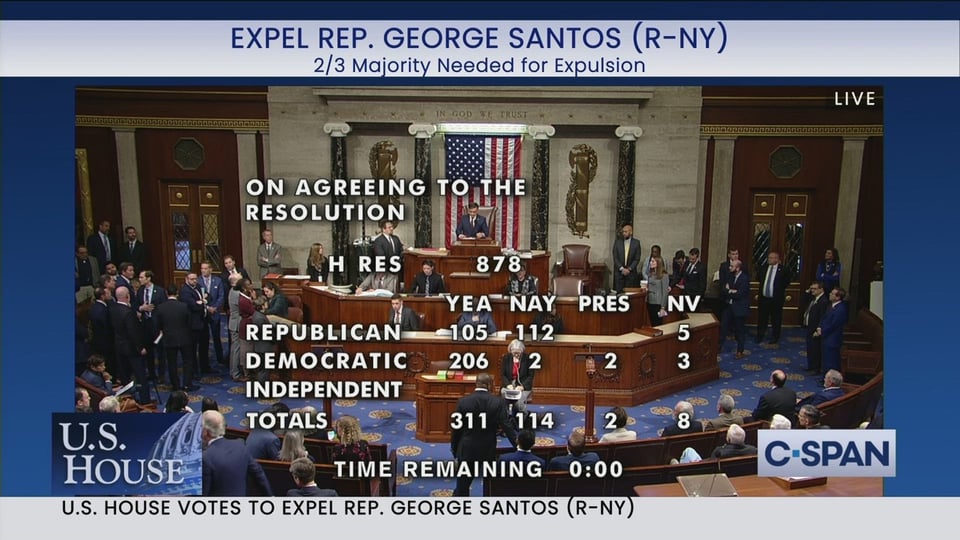
The Republican leadership voted to keep Santos.
@SpeakerJohnson -- no
@SteveScalise -- no
@EliseStefanik -- no
Democrats spot political opportunity in George Santos' expulsion.
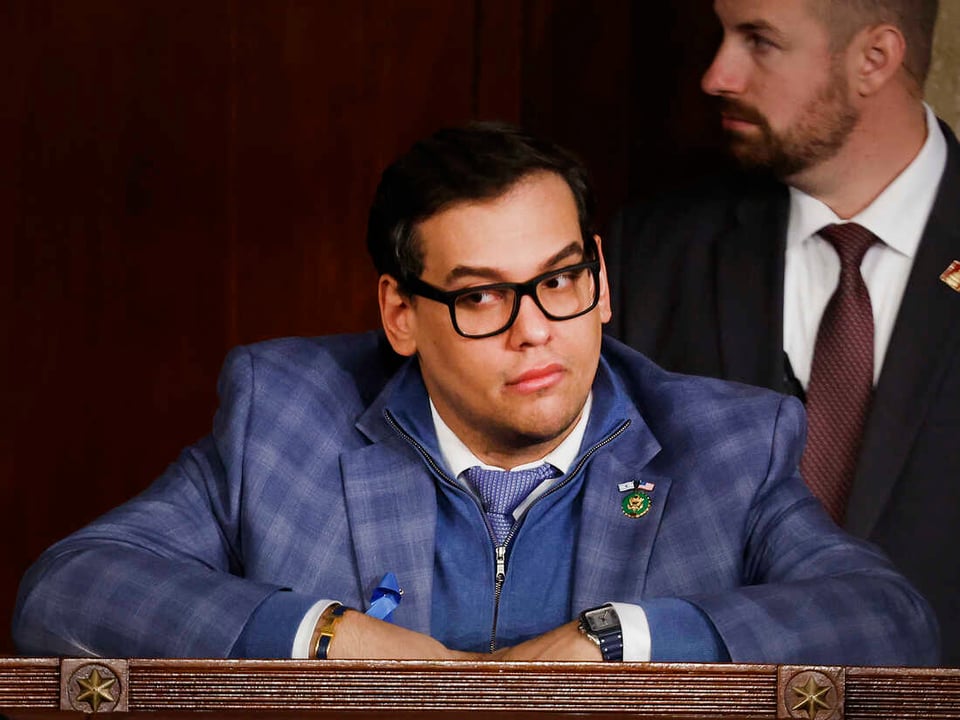
The House of Representatives voted 311-114 to expel New York Republican George Santos, making him the sixth House member to ever be expelled in a vote of Congress.
Democrats are looking to the expulsion of Rep. George Santos (R-N.Y.) on Friday as a chance to not only flip a highly competitive House seat, but get a political boost ahead of 2024.
Why it matters: Even as more than 100 Republicans voted to kick Santos out of Congress, a majority of the party voted against expulsion, including most of GOP leadership.
State of play: Santos' removal spurs a special election to fill his seat that could happen in a matter of months, with the nominees chosen by county party leaders.
Democrats may select former Rep. Tom Suozzi, who represented the seat from 2017 to 2023 and previously beat Santos in 2020. Former state Sen. Anna Kaplan is another potential candidate.
Republicans have several prospective candidates including state Sen. Jack Martins and Nassau County legislator Mazi Melesa Pilip.
What they're saying: Democrats are already signaling plans to spend heavily to win back the district, which went for President Biden by 8 percentage points in 2020.
House Majority PAC President Mike Smith said the Democratic super PAC "plans to play a significant role in the NY-03 special election, and we will do whatever it takes to flip this district blue."
"House Democrats are ready to get to work and take back this seat," Democratic Congressional Campaign Committee Chair Suzan Delbene (D-Wash.) said in a statement.
What they're saying: Some Democrats cast the vote as having political ramifications beyond New York, arguing House Speaker Mike Johnson's (R-La.) opposition to expulsion will damage his image.
"I think that the speaker made a big mistake by trying to protect him," said swing-district Rep. Greg Landsman (D-Ohio). "I think it's going to be a big problem for him and his credibility."
Rep. Susan Wild (D-Pa.), another swing district member, said leadership's opposition was "disrespectful" to the vulnerable New York Republicans who pushed strongly to remove Santos.
"I think Democrats will win the next election, there's absolutely no question about it," said former Speaker Nancy Pelosi (D-Calif.), adding of Republican leadership: "They just keep making matters worse for themselves."
Zoom in: Some Democratic campaigns sent out fundraising appeals about Santos' expulsion shortly after it happened.
The DCCC sent out an email focused on retaking Santos' seat, saying "we need to move NOW ... George Santos only won this seat by roughly 25,400 votes — so this special will be competitive… and EXPENSIVE."
Rep. Katie Porter (D-Calif.), who is running for Senate, sent a fundraising appealasking donors to "split a donation right now between my campaign and the NY-03 Special Election Nominee Fund to help Democrats flip Santos's seat blue[.]"
The intrigue: While most members of Republican leadership voted against expulsion, National Republican Congressional Committee Chair Richard Hudson (R-N.C.) voted for it.
The other side: Rep. Nick LaLota (R-N.Y.) argued that he and other New Yorkers will be rewarded politically "now that we've ... dealt with Santos in a manner in which the public expected."
"I think members like me and [Andrew] Garbarino, [Anthony] D'Esposito, [Mike] Lawler, [Marc] Molinaro, will be credited by our voters for having done the right thing," LaLota said.
He added, "If 12 months from now, they want to use George Santos ... in some random race in the middle of the country, I don't know if that's going to be a winning strategy for them." (Axios).
So you will know…
The two Democrats who voted to keep Santos in Congress were Virginia Rep. Bobby Scott and Georgia Rep. Nikema Williams. "George Santos is not worthy of serving in the House of Representatives," Williams said in a statement. "He will likely be convicted of the crimes of which he has was accused. This is the People's House - and although the House Ethics Committee findings were damning, the people of New York's Third Congressional District should decide who represents them. I'll always side on giving power to the voters."
Two other Democrats, Texas Rep. Al Green and Illinois Rep. Jonathan Jackson, voted present.
Jackson said he did so because the ethical events transpired as Santos ran for office, an Axios reporter wrote on X.
______________________________
Trump had a bad day in Court yesterday.
Trump, not acting in presidential capacity on Jan. 6, can be sued, court rules.

Donald Trump is not entitled to absolute presidential immunity against criminal charges over his efforts to overturn the 2020 presidential election, a federal judge ruled, saying the office doesn’t come with a “lifelong ‘get-out-of-jail-free’ pass.”
US District Judge Tanya Chutkan on Friday rejected Trump’s early efforts to get the federal indictment against him in Washington tossed out, including his contention that he could not be prosecuted over actions he took after the 2020 election while he was president.
Trump’s “four-year service as Commander in Chief did not bestow on him the divine right of kings to evade the criminal accountability that governs his fellow citizens,” the judge wrote.
Chutkan also denied Trump’s separate motions to dismiss the case on the grounds that the charges are unconstitutional.
The judge’s decision is expected to be swiftly appealed by Trump’s legal team. His attorneys already have signaled that they would challenge a loss on the immunity issue, and believe that all of the criminal case proceedings should be paused until that issue is fully litigated, potentially up to the US Supreme Court.
Trump spokesperson Steven Cheung said in a statement that the former president would challenge Chutkan’s decision. He accused “radical Democrats” of trying to “destroy bedrock constitutional principles and set dangerous precedents that would cripple future presidential administrations and our country as a whole, in their desperate effort to interfere in the 2024 Presidential Election.”
A spokesperson for Special Counsel John “Jack” Smith’s office declined to comment.
A trial in the federal election obstruction case against Trump is set to begin March 4. Trump’s lawyers have pushed for longer timelines in the case and unsuccessfully argued to delay a trial until after the 2024 general election in November.
Chutkan’s decision came hours after the US Court of Appeals for the DC Circuit rejected Trump’s effort to claim presidential immunity against civil claims seeking to hold him responsible for the violence at the US Capitol on Jan. 6, 2021.
No Civil Immunity
The appeals court judges found that he wasn’t entitled to the immunity at this stage because the civil lawsuits brought by Democrats in Congress and law enforcement officers alleged his conduct was part of his political campaign, and not his presidential duties. The US Supreme Court has held in the past that presidents can’t be sued over official acts.
The DC Circuit panel said it wasn’t ruling on the question of presidential immunity against criminal prosecution, only certain civil claims. But the decision offers a road map for Smith’s office to defend Chutkan’s decision once Trump appeals it to the same court.
The court said he could potentially revive the civil immunity fight later if he presented evidence that he was, in fact, carrying out official presidential duties.
Chutkan wrote that while she was rejecting Trump’s claim of absolute immunity against prosecution, she wasn’t ruling yet on arguments he might make that the alleged criminal acts were part of his official duties and could be entitled to immunity.
In the 48-page opinion, Chutkan held that the “text, structure, and history” of the US Constitution doesn’t permanently shield former presidents against “investigation, indictment, prosecution, conviction, and punishment for any criminal acts undertaken while in office.” The Constitution’s 18th century drafters wanted the US chief executive to be “wholly different from the unaccountable, almost omnipotent rulers of other nations at that time,” she wrote.
No Free Pass
“Whatever immunities a sitting President may enjoy, the United States has only one Chief Executive at a time, and that position does not confer a lifelong ‘get-out-of-jail-free’ pass,” she wrote.
The judge rebuffed other arguments Trump’s lawyers raised, including that a president could only be criminally prosecuted if they were first convicted in a US Senate impeachment trial or that the threat of future prosecution could interfere with a sitting president’s ability to carry out their duties.
“If the specter of subsequent prosecution encourages a sitting President to reconsider before deciding to act with criminal intent, that is a benefit, not a defect,” Chutkan wrote.
Chutkan has yet to rule on Trump’s motions to dismiss the indictment on claims that he’s a victim of “selective and vindictive prosecution” by the Justice Department under his political rival President Joe Biden and that the charges are otherwise invalid.
In Friday’s opinion, she rejected Trump’s contention that the indictment violated the First Amendment since prosecutors alleged his speech and political activities were used “as an instrument of a crime.” Trump’s acquittal in his 2021 Senate impeachment trial also didn’t create a double jeopardy problem, she wrote.
And the judge concluded that the indictment didn’t violate Trump’s due process rights because he would have been on “fair notice” that his conduct leading up to the Jan. 6 attack might be illegal.
“There is also a long history of prosecutions for interfering with the outcome of elections,” she wrote. (Axios).
https://storage.courtlistener.com/recap/gov.uscourts.cadc.38510/gov.uscourts.cadc.38510.2029465.0.pdf
Trump Denied Immunity Against US Election Subversion Charges.
Donald Trump is not entitled to absolute presidential immunity against criminal charges over his efforts to overturn the 2020 presidential election, a federal judge ruled.
US District Judge Tanya Chutkan on Friday rejected Trump’s early efforts to get the federal indictment in Washington tossed out, including his contention that he could not be prosecuted over actions he took after the 2020 election while he was president.
Trump’s “four-year service as Commander in Chief did not bestow on him the divine right of kings to evade the criminal accountability that governs his fellow citizens,” the judge wrote.
Chutkan also denied Trump’s separate motions to dismiss the case on the grounds that the charges are unconstitutional.
The judge’s decision is expected to be swiftly appealed by Trump’s legal team. His attorneys already have signaled that they would challenge a loss on the immunity issue, and believe that all of the criminal case proceedings should be paused until that issue is fully litigated, potentially up to the US Supreme Court.
A spokesperson for Special Counsel John “Jack” Smith’s office declined to comment. A Trump spokesperson did not immediately respond to a request for comment.
A trial in the federal election obstruction case against Trump is set to begin March 4. Trump’s lawyers have pushed for longer timelines in the case and unsuccessfully argued to delay a trial until after the 2024 general election in November.
Chutkan’s decision came hours after the US Court of Appeals for the DC Circuit rejected Trump’s effort to claim presidential immunity against civil claims seeking to hold him responsible for the violence at the US Capitol on Jan. 6, 2021.
The appeals court judges found that he wasn’t entitled to the immunity at this stage because the civil lawsuits alleged his post-election conduct was part of his political campaign, and not his official duties as president. The court said he could potentially revive the civil immunity fight later if he presented evidence that he was, in fact, carrying out official presidential responsibilities at the time.
The DC Circuit panel said it wasn’t ruling on the question of presidential immunity against criminal prosecution, only certain civil claims. But the decision offers a road map for Smith’s office to defend Chutkan’s decision once Trump appeals it to the same court. (Bloomberg).
______________________________
Sandra Day O’Connor, the first female Justice, died yesterday, at 93.
Sandra Day O'Connor, first woman on the Supreme Court, dies.
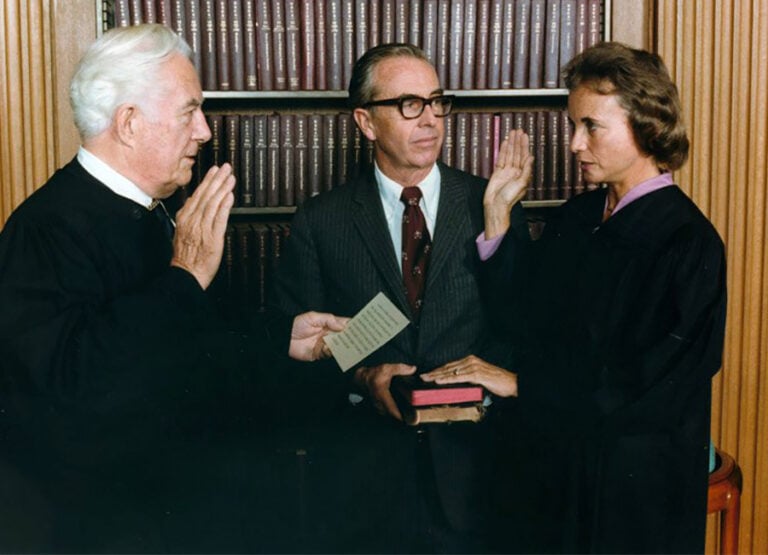
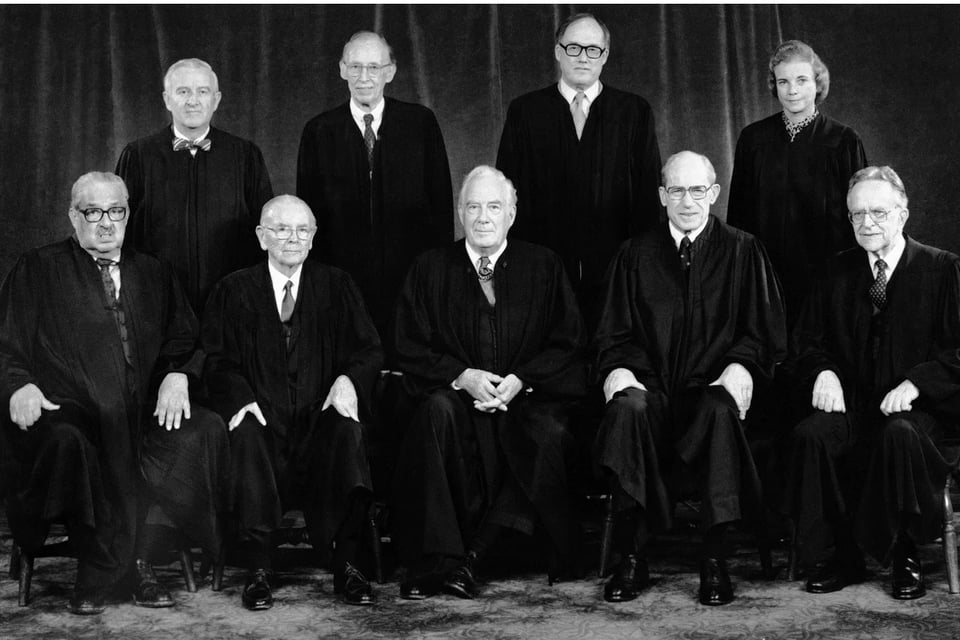

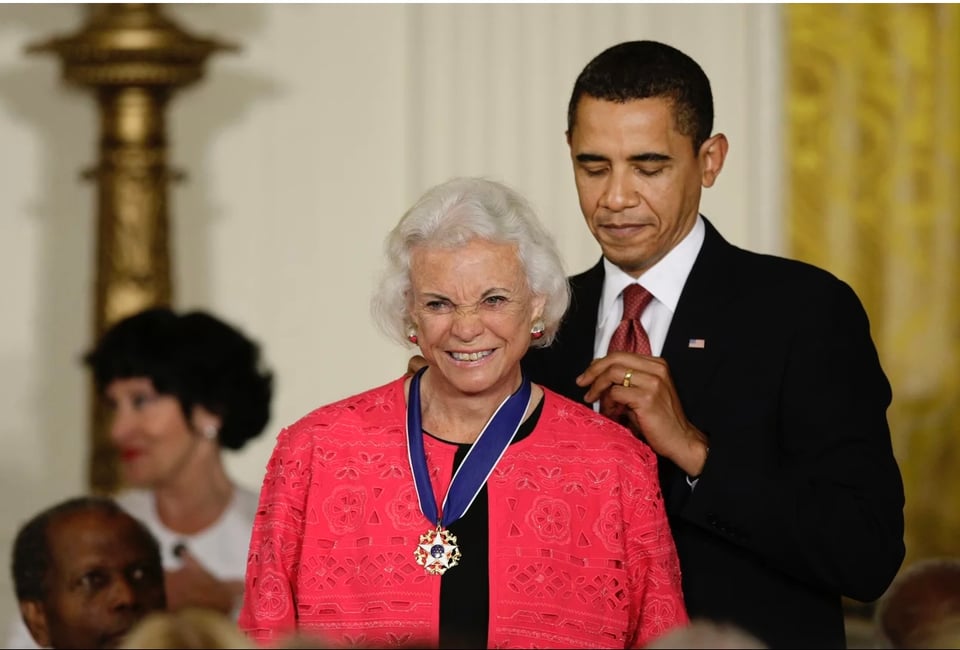
Retired Supreme Court Justice Sandra Day O'Connor, the first woman to serve on the court, died Friday in Phoenix, Ariz., of complications related to advanced dementia, probably Alzheimer's, and a respiratory illness, the court announced. She was 93 years old.
O'Connor was appointed to the court by President Reagan in 1981 and retired in 2006, after serving more than 24 years on the court.old.
O'Connor served on the court for a quarter of a century and, after that, became an outspoken critic of what she saw as modern threats to judicial independence, particularly the election of state judges, which she believed eroded independent judicial decision-making, and public confidence in the courts.
While on the court, O'Connor was called "the most powerful woman in America." Because of her position at the center of a court that was so closely divided on so many major questions, she often cast the deciding vote in cases involving abortion, affirmative action, national security, campaign finance reform, separation of church and state, and states' rights, as well as in the case that decided the 2000 election, Bush v. Gore — a decision she later hinted she regretted.
Her retirement allowed President George W. Bush to appoint a much more conservative justice, Samuel Alito, in her place, and that appointment took the court in a far more conservative direction.
Justice Sandra Day O'Connor Retires
O'Connor's retirement was the last step in a long balancing act between family and career. In 2005, O'Connor's husband was suffering from Alzheimer's disease, and when the ailing Chief Justice William Rehnquist told her that he was putting off his retirement, O'Connor decided that with her husband's health declining, she could not wait and risk the possibility that the court would have two vacancies at once.
As it turned out, that's what happened anyway. O'Connor announced her retirement, and the chief justice died weeks later. She stayed on for another six months while confirmation hearings proceeded, and in a cruel twist of fate, her husband's health took such a precipitous downward turn that he had to be placed in a home, and later died.
But on that June day in 2005 when O'Connor announced her retirement, she wept; she later made quite clear that she regretted the decision to step down. She went on to lead a multifaceted life, crisscrossing the United States and the rest of the world, crusading against threats to judicial independence and advocating for more civics instruction in public schools to teach students about the structure of the U.S. government.
A rising star
Born in Texas, O'Connor spent her early life riding horses and roping steers on the Lazy B, a 250-square-mile cattle ranch owned by her parents on the Arizona-New Mexico border.
At age 10, she was sent away to school in El Paso, and at age 16 she enrolled at Stanford, eventually graduating from law school third in her class.
On the job market, she soon learned nobody wanted to hire a female lawyer. After every job door was closed in her face, a desperate O'Connor finally made an offer to the San Mateo County attorney, an offer that she hoped he couldn't refuse.
"I wrote him a very long letter explaining all the reasons why I thought that I would be helpful to him in the office and offering to work for nothing, if that was necessary," O'Connor said in 2003 interview with NPR.
In the beginning it was indeed necessary; she worked for free and she even shared office space with the county attorney's secretary. But she soon was put on salary, and when she and her husband, John, moved to Arizona, she continued practicing law, stopping only when a dearth of babysitters forced a five-year hiatus to raise her three sons.
Soon she was a figure to be reckoned with in Arizona's political life. Elected to the state Senate, she quickly rose in Republican ranks to become the majority leader, and then was appointed a state trial judge and a state appellate court judge. By then, it was 1981, and with the retirement of Justice Potter Stewart, President Ronald Reagan had a Supreme Court vacancy to fill.
First female justice
Stewart's imminent retirement was known to only a few inside the administration, and there was initially something of a battle over whether the president should fulfill his campaign promise to appoint a woman.
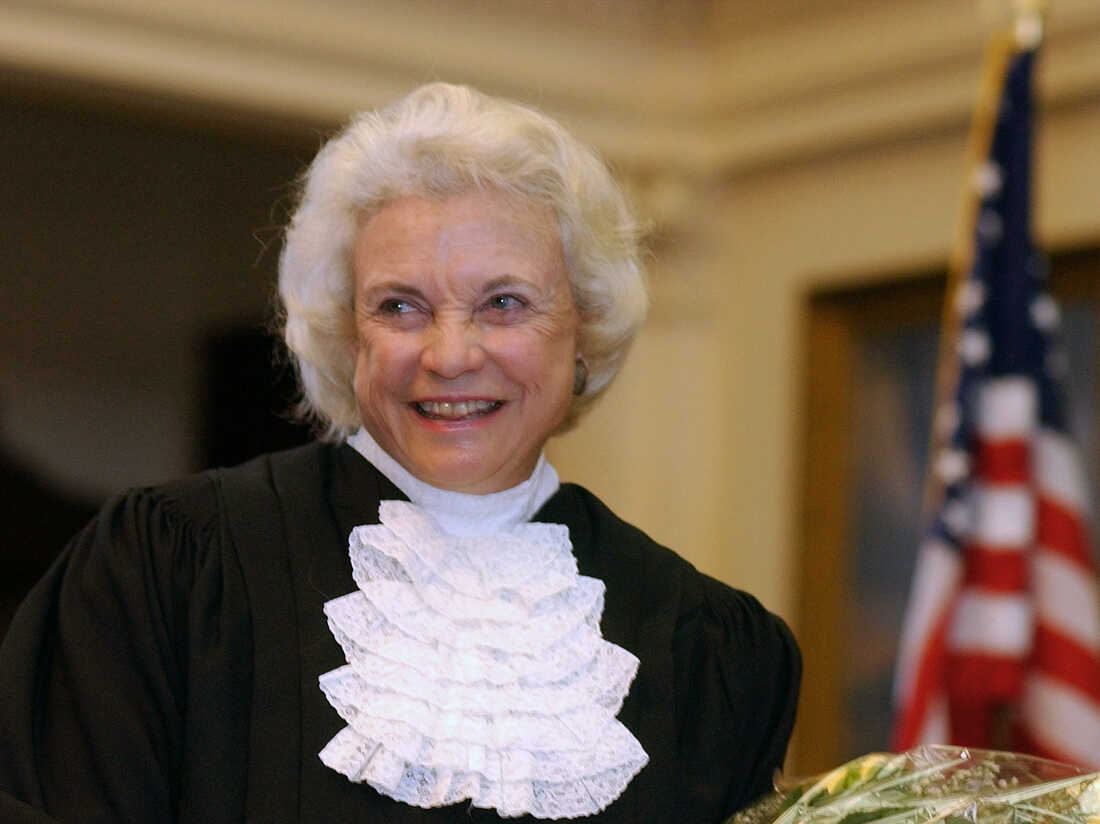
Supreme Court Justice Sandra Day O'Connor is shown before administering the oath of office to members of the Texas Supreme Court in Austin in 2003.
Kenneth Starr, then an assistant to Attorney General William French Smith, recalls that staff aides examined Reagan's campaign words carefully, noting that he had not made an iron-clad pledge. Some administration insiders urged the president to use this first appointment to name Robert Bork or some other conservative luminary to the high court. But that was not to be.
"Reagan was not a word parser, and he felt that he had made a moral commitment to appoint a qualified woman to the Supreme Court, that it was long overdue ... and that's what our marching orders were," Starr said in an interview with NPR.
But back then, the list of qualified women with any conservative credentials at all was a short one. Starr believes that O'Connor's name was first suggested by then-Justice Rehnquist, a fellow Arizonan and a classmate of O'Connor's at Stanford. When O'Connor was spirited to the White House for an interview with Reagan, the two Westerners had an immediate rapport, and O'Connor soon won the nod.
O'Connor later acknowledged that her appointment was an "affirmative act" — that she was not among the most qualified judges or scholars back then. But still, she won quick confirmation.
An enormous impact on the law
Once on the court, O'Connor's main concern, she later said, was whether she could do the job. If she stumbled badly, she said, it would make life much more difficult for women.
As it turned out, of course, O'Connor's appointment gave a huge boost to women in the law.
"The minute I was confirmed and on the court, states across the country started putting more women ... on their Supreme Courts," O'Connor said. "And it made a difference in the acceptance of young women as lawyers. It opened doors for them."
In the years that followed, O'Connor's impact on the law would be enormous. On the court, she became part of a conservative states' rights majority, voting, for example, to strike down key portions of the Brady gun control law.
On the subject of racial discrimination and affirmative action, O'Connor was the key vote. In the 1980s and '90s, she wrote landmark court decisions limiting the use of affirmative action for minority contractors and invalidating the use of race as the predominant factor in drawing majority Black congressional districts. But a decade later, in 2003, O'Connor wrote the court's opinion declaring that colleges and universities are justified in using race as a factor in college and graduate school admissions.
"Such diversity promotes learning and better prepares students for an increasingly heterogeneous workforce, for responsible citizenship, and for the legal profession," O'Connor said then.
In each of the race cases, O'Connor followed a well-trodden path for her: decide the case before you, make as few broad and sweeping rules as possible, and leave the door open for future change in a different set of circumstances.
In 2004, she walked a similar careful line as author of the key decision on the president's power to detain enemy combatants at Guantanamo Bay, Cuba. Repudiating the Bush administration's position, she declared that even in wartime, the president does not have a "blank check" allowing him to indefinitely detain American citizens without charge and without a chance to rebut the government's allegations of wrongdoing.
"We conclude that a citizen detainee seeking to challenge his classification as an enemy combatant must receive ... a fair opportunity to rebut the government's factual assertions before a neutral decision-maker," O'Connor said when she announced the court's decision in Hamdi v. Rumsfeld.
A middle ground
In no area, though, was O'Connor more careful — and successful — at carving out a middle ground than on questions involving abortion. When she joined the court, a woman's right to an abortion was spelled out in Roe v. Wade as a relatively absolute right to privacy. But less than two years after becoming a justice, O'Connor dissented from a major extension of Roe, saying that in her view, a state could regulate abortions unless those regulations imposed an "undue burden" on a woman's right to choose.

Former Supreme Court Justice Sandra Day O'Connor (center), with Supreme Court Justice Ruth Bader Ginsburg (left) and Sonia Sotomayor (right), speaks during a forum to celebrate the 30th anniversary of O'Connor's appointment to the Supreme Court, at the Newseum in Washington, D.C., on April 11, 2012.
Six years later, she deprived the court's four conservatives of a fifth vote to overturn Roe, but in a separate concurring opinion allowed more state restrictions on abortion. In 1992, the issue was back before the court and O'Connor, joined this time by Justices David Souter and Anthony Kennedy, voted to sustain what they called the "core" holding of Roe, a woman's right to an abortion, but using O'Connor's undue burden test.
"Some of us as individuals find abortion offensive to our most basic principles of morality, but that can't control our decision. Our obligation is to define the liberty of all, not to mandate our own moral code," O'Connor said in June of 1992 when she announced the court's decision in Planned Parenthood v. Casey. "We reaffirm the constitutionally protected liberty of the woman to decide to have an abortion before the fetus attains viability and to obtain it without undue interference from the state."
Eight years later, O'Connor provided the fifth and deciding vote on abortion, this time invalidating a so-called partial birth abortion law because it provided no exception to preserve the health of the mother, and thus imposed an undue burden. Within a year of her departure from the court, however, a new, more conservative court majority reached the opposite conclusion and upheld a federal ban on so-called partial birth abortions. It was a pattern that was to repeat itself in other areas of the law after O'Connor left.
When she was appointed to the Supreme Court, O'Connor knew she would be a role model for women. She persevered even through a bout with breast cancer. For a year, she wore a wig, looked drained and wan, but never missed a court day.
She presided over a period in American law when women moved from being anomalies in the courtroom to the majority of the graduates in many major American law schools. And she left a profound mark on the history of the Supreme Court and the nation. (NPR).
Casey v. Planned Parenthood. The O’Connor Legacy.
Justice O’Connor joined the controlling opinion in Planned Parenthood v. Casey, the 1992 decision that, to the surprise of many, reaffirmed the core of the constitutional right to abortion established in 1973 in Roe v. Wade.
To overrule Roe “under fire in the absence of the most compelling reason to re-examine a watershed decision,” she wrote in a joint opinion with Justices Anthony M. Kennedy and David H. Souter, “would subvert the court’s legitimacy beyond any serious question.”
Last year, the court did overrule Roe, casting aside Justice O’Connor’s concern for precedent and the court’s public standing. In his majority opinion in Dobbs v. Jackson Women’s Health Organization, Justice Alito wrote that Roe and Casey had “enflamed debate and deepened division.” (The New York Times).
______________________________
Israeli-Hamas War resumes.
What you should know.

Following a week-long cease-fire in Gaza, fighting between Israel and Hamas resumed early Friday morning after the two failed to reach agreement on the list of hostages to be released, and Hamas launched rockets at southern Israel. Israel renewed airstrikes in Gazaand called on inhabitants of the southern city of Khan Younis to evacuate. Qatar said that talks to renew the truce are still ongoing.
Here’s what you need to know 56 days into the war
■ According to sources in Israel, Israel and Hamas had agreed Thursday on the release of ten women hostages held in Gaza on Friday, but Hamas failed to send the list of the captives. On Friday morning, PM Netanyahu accused Hamas of violating the cease-fire agreement.
■ An hour before the cease-fire was due to end early Friday morning, Hamas launched a number of rocket barrages at southern Israel, the first since the temporary truce came into effect on November 24.
■ U.S. Secretary of State Anthony Blinken said Friday that the cease-fire ended because Hamas had breached the agreement.
■ Hamas blamed Israel for the end of the cease-fire, saying it had offered Israel to release adults and the bodies of Israelis, but the list was not accepted. A Hamas official in Lebanon told Al-Jazeera that they "seriously wanted and are still interested in a truce."
■ Qatar's Foreign Ministry said that negotiations were still ongoing to restore the cease-fire, saying Israel’s renewed bombardment of Gaza “complicates mediation efforts.” Foreign sources told Haaretz that talks are underway to renew the deal, adding that the chances for a new agreement are low. (Haaretz).
HOSTAGES STILL IN CAPTIVITY.
Israel said on Friday that 136 hostages remain in Gaza. They include 119 men and 17 women and children, according to military spokesperson Daniel Hagari. Roughly 10 of the hostages are 75 and older, the Prime Minister’s Office said Friday.
The vast majority are Israeli while 11 are foreign nationals, including eight from Thailand, one from Nepal and Tanzania each, and one French-Mexican.
Earlier, government spokesperson Eylon Levy listed the youngest hostage, 10-month-old Kfir Bibas, his 4-year-old brother Ariel and their mother Shiri as still being among the hostages. The military has said it’s investigating a Hamas claim that the boys and their mother were killed in an Israeli airstrike. (Associated Press)
______________________________
See what the Bloomer Girls wrought.
Women's elite sports revenue will cross billion dollars in 2024: Deloitte.

Nov 29 (Reuters) - Annual global revenue for women's elite sports will cross the billion-dollar threshold for the first time in 2024, Deloitte said on Wednesday.
The predicted $1.28 billion revenue based on matchday earnings, broadcast and commercial revenue is "at least 300 per cent higher" than their previous valuation three years ago, Deloitte said.
"Women’s sport is increasingly being viewed as a unique product that is becoming ever more distinct from men’s elite sport," said Jennifer Haskel, insight lead for Deloitte's Sports Business Group.
"This surge in fan and investor engagement is leading to new and improved opportunities for clubs and leagues."
Commercial deals by leagues and teams would bring in the majority of the revenue at 55%, while broadcast would account for 27%, Deloitte said.
Matchday revenue is expected to grow by five per cent from 2023 and contribute 19% to the pool.
Soccer and basketball are predicted to be the most lucrative sports for women in 2024, bringing in 71% of the total global revenue.
"In 2024 women's elite sports will continue to be allocated additional prime time broadcast slots, making the women's events easier to find and watch," Deloitte said. (Reuters.)
______________________________
Schrafft’s, an American Restaurant Icon, Is Coming Back to NYC.
Ahead of its relaunch in Midtown, Schrafft’s is bringing back its coffee and pastries for the holidays — starting this weekend.

Schrafft’s — an American restaurant icon of the early 20th century that had dozens of full-service restaurants around town and across the country at its peak — is coming back to Midtown after closing down its last more than 40 years ago.
Ahead of the reopening, Schrafft’s is hosting a Manhattan pop-up for the holidays for a preview of what’s to come. The restaurant chain, which first launched as a Herald Square candy store in 1898, was known for its emphasis on quick-service meals sold at an affordable price point in dining rooms that, during its prime years, felt elegant.
Starting December 3, on three consecutive Sundays during the holidays, Schrafft’s is hosting a pop-up in front of 57th Street jewelry store Tiffany & Co. — a nod to the restaurant chain’s appearance in the film Breakfast at Tiffany’s. The Sunday series in December is part of Fifth Avenue’s Open Streets events with other food vendors.
Schrafft’s president, James Byrne, says he looked in archives to old Schrafft’s recipes for the coffee and danishes they will be serving with an abbreviated menu using the same packaging Audrey Hepburn held in the movie and that the restaurant provided as craft services for the set.
In 2019, the New York Post reported that a relaunch of Schrafft’s could be on the horizon, but the pandemic scrapped those initial plans. Byrne tells Eater he’s exclusively looking at Midtown to bring back a flagship restaurant, as an homage to the company’s roots, and plans to sign a lease next year, potentially as early as January 2024.
Byrne is the godson of Gerald Shattuck, former president of the Frank G. Shattuck Company behind the restaurants, and his business partner is John Schadler, the nephew of former Schrafft’s CEO Morgan Shattuck.
Byrne grew up in the restaurants, but professionally worked in marketing and advertisement, making this his first time running a restaurant. He felt it was his duty to restore the name to its former glory: “It was essential to me to keep it in the family,” he says.
Schrafft’s as a brand was first launched by William G. Schrafft as a Boston candy manufacturing company. By 1898 Frank G. Shattuck opened the first store in New York, first as a candy store on West 36th Street and Broadway. The first New York City location to serve a full-service meal was reportedly at 54 West 23rd Street, in what was then- considered the Ladies’ Mile shopping district (Frank’s sister, Jane Schrafft is credited with helping launch the restaurant). Affordability and consistency, with items made fresh and to order, was their bread and butter: a menu from a New York location in the 1960s lists a breakfast combo platter for 95 cents.
“Our steaks would have put Peter Luger to shame. And it was clean, which is not so unusual today but was then. The most popular dishes were Lobster Newburg, Creamed Chicken on Toast, Fillet of Sole and, of course, the hot fudge sundae,” Frank’s great-grandson, Frank M. Shattuck, told the New York Times back in2004.
At one point, there were more than 50 Schrafft’s that stretched across the city and beyond to Philadelphia, Atlanta, and Palm Beach, Florida. Over the years, like many luncheonettes, it became known as a safe place women entering the workforce could dine in alone and likewise was known for hiring women as cooks and as higher-level managerial positions, according to the Times. After the chain was bought out and changed handsin the late 1960s, the brand “kind of collapsed under its own weight,” says Byrne, focusing more on consumer packaged goods than the restaurants themselves.
The last Schrafft’s restaurant closed in the 1980s and by that point, the original family was not involved. But the chain has remained a stakeholder in New York restaurant history and has been the subject of several books, including Ten Restaurants that Changed America.
Byrne looked to other relaunches like the Monkey Bar and Gage & Tollner and how they “leverage that incredible past so that it made sense to people today.” He references the way a restaurant like Balthazar operates with a full-service dining room and an attached bakery, akin to what he hopes the new Schrafft’s will feel like, timeless, but remixed for a younger crowd with a to-go area. Byrne intends for the restaurant to serve alcohol, like the original location. Eventually, the plan is to slowly, “and carefully,” scale to multiple locations.
Despite Midtown real estate struggling to refill its office buildings post-pandemic, Byrne says it felt right, wanting to attract a mix of locals and tourists alike. For Byrne, the decision to reopen in Midtown was “pragmatic, as much as it is historical,” he says. “First of all, Midtown is our home. You know, we had locations in Rock Center, the Chrysler Building...nearly every premiere Manhattan building had a Schrafft’s.” (Eater).
______________________________